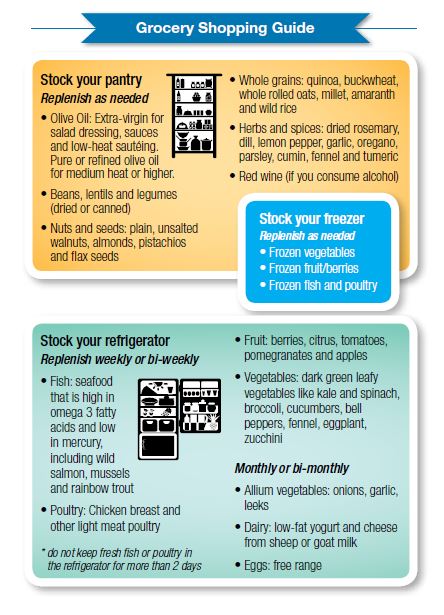AARP Hearing Center

Guest author Emmaline Rasmussen, MS, RD, E-RYT, is a nutrition specialist and clinical research dietitian at NorthShore University HealthSystem.
It’s that time of year again when many of us re-think our diets ahead of warmer weather, swim suits, and shorts, so we’d like to take this opportunity to talk about the Mediterranean diet and what it can do for your health. Not only does a healthy Mediterranean-style diet improve your heart health (old news) but it also plays a vital role in improving your BRAIN health by reducing your risk of developing Alzheimer’s, and even Parkinson’s Disease (new news!) A brain-friendly Mediterranean diet can reduce Alzheimer’s risk by up to 50%.
You may already be familiar with the benefits of following a Mediterranean diet, but the term ‘diet’ is a bit misleading. It is not a diet. It is adopting food choices and incorporating them into a healthier lifestyle to benefit your overall health. The Mediterranean “food style” does not focus on eating less food, or on counting calories, nor does it imply Mediterranean cuisine. It is about incorporating MORE of the good foods into your choices, and as an intended consequence, omitting some of the ‘bad.’ It focuses on incorporating fresh fruits and vegetables as the base of your diet, and weaving in whole grains, fish and poultry, ample use of olive oil, especially extra virgin, and red wine.
Consider the cooking styles of the countries surrounding the Mediterranean Sea – Cyprus, Greece, Italy, Malta, Spain and Turkey. Greece and Turkey continue to be among the world’s leaders in vegetable consumption, according to the OECD. The Food Based Dietary Guidelines in Greece encourage the consumption of 6 servings of vegetables, in addition to 3 servings of fruits, per day. According to America’s Health Rankings, vegetable consumption in the United States varies from a high of just over 2 servings per adult per day in California to a low of 1 and 1/2 servings per adult per day in Louisiana and Mississippi. Nationally, the median consumption is less than 2 servings per day for each adult. We can do better than that.
Always start with veggies! Fill at least half your plate with non-starchy vegetables including green leafy vegetables. This limits the real estate on your plate for less nutritious and often calorie-dense options. If you are at a party with a buffet, the first trip to the buffet should be for vegetable-based dishes only!
Embrace healthy fats. Cook with pure or refined olive oil instead of butter. Opt for extra virgin olive oil and fresh squeezed lemon juice or vinegar over your salad in lieu of bottled, pre-made salad dressings. Choose omega-3 rich seafood such as wild caught salmon over red meat or pork.
Allow for occasional, reasonable indulgences. If you find yourself at a birthday party and can’t pass up the cake or the dip don’t worry! There’s no reason to completely avoid “treats” or to feel guilty for an occasional slip-up. As long as the overall diet pattern is a healthy one, enjoy!
Bon appétit!































































